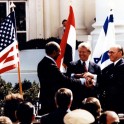This place is wild. It's wild and unpolished, the last untamed area of the United States, as if time has stood still since the days of Davy Crockett and Daniel Boone. I don't think there is any number of country songs, documentaries or articles that can embody what it truly feels like to live here...to stand in the midst of thousands of acres of ancient, eroding ridgelines and tall, decaying trees. To walk along rutted mountain paths, wondering where they used to go and what they were used for. To drive past little crumbling shacks and eroded family tombstones tucked away on hillsides, wishing they could tell you their stories. To look up at a sky so blue it hurts your eyes, and gaze over shades of blue mountain tops that make you feel tiny. Living here comes with its struggles. The houses are cobbled together and the vehicles falling apart; the winding, one-lane holler roads are not maintained well; the garbage service is unreliable. Everything is covered in dust or mud, all of the time. I have worn my hiking boots more than any other pair of shoes I own and I have to sweep every day because of the dirt tracked in. Housing is cheap but utilities and car insurance are some of the most expensive in the country, due to dangerous driving and corporate monopolies taking advantage of people. Roads being plowed in the winter is not a guarantee, nor is running water, so people are always prepared to be house-bound for several days at a time. Like I said - it's as if time stopped here 200 years ago. I have yet to figure out why God sent me here. Most days it feels like I am just being tested, as if He is letting me explore a different part of my personality - the wild, mountain-girl side. As a kid I loved the book "My Side of the Mountain," and now I actually live on the side of a mountain. Do I have what it takes? Do I truly have what it takes to be tough, to be self-reliant, to live without life's luxuries? This area may be poor in monetary resources, but the people are rich in love and kindness. I have honestly never met more friendly, generous people. I know they're that way because it's the only thing that keeps them going out here in this wild, unpredictable land - this land that was raped by the coal companies, taken advantage of by the corporations, and then forgotten by the rest of America. All they have are each other, and they take care of each other. That is the most beautiful thing I have seen out here. Whether or not I truly fall in love with this place has yet to be determined. No one ever said that trying new things was easy. But every new thing and trial holds a lesson, and I know that no matter what happens in the end, I will be grateful I experienced Kentucky.
“To Noor-e jaan-e man hasti[1].” She could still hear him whispering these words into her ear, holding her tight to his chest, running his fingers through her dark brown locks. Earlier that night, as the Imam had finally announced them husband and wife, the loudest echo in her head was the sound of her own heart, beating so wild that any cheering or loud Afghan folk songs seemed almost faded. But now, as she was laying in his embrace, the only sound she could hear was the beating of his heart. In her mind, she silently prayed to Allah, asking Him to always bring them back to each other, no matter what comes up their way. They've been growing up together as playmates, classmates, family friends, and each other's “almost” secret, unspoken love. When Noor graduated from high school and got accepted into Kabul university, it was harder than ever for Saeed to hide his feelings for her. She was the light of his life, not any of those boys cruising around the university in their fancy cars. That night, when Noor heard Saeed's dad talking to her dad about them getting married, her thoughts and heart beat were all over the place for the next couple of days. That was always the risky part of trusting her heart: fairy tales like this might be the fine line between possibility and reality. Noor wasn't usually a pessimist. She had figured out a long time ago that she lets her heart decide for her instead of her head most of the time. She had also seen the fair share of pain that these decisions could bring her. Falling in love with Saeed was one of these decisions. It started from her heart and before she knew it, spread out through her whole body. Keeping her feelings in her secretive comfort felt relaxing but she wasn't sure if she can hold on like this for any longer. Saeed knew that Noor didn't want to start a family in Afghanistan. That was what they'd both agreed on. Getting married back home and officially starting their lives in the U.S., where Saeed's step- brother, Hamzeh, was sponsoring them. Everything seemed to be working out in the most magnificent way possible: marrying the only person they'd gladly gave their hearts to, the tiniest details about their wedding ceremony working in their favor, and having all they needed for entering the land of opportunities and starting a new chapter in their passports. Things working out this easily felt too good to be true. - Financial challenges were the first ugly side of moving to a different country. Saeed was working full time in a factory and Noor had picked up a couple of shifts in their local supermarket. They'd both wake up in the dark, and come back home in the dark. Everyone had told them that this was something they'll go through. The only thing that mattered was to survive it. There was no turning back. Or it's better to say that none of them even wanted it. - Three days of morning sickness in a row. She had managed to pull herself together and carry out the first two days. But today, pain and stiffness was glistening down her arms and legs like never before. Saeed had already covered her body with three woolen blankets but she couldn't stop shivering. The room kept spinning around her head and the thought of getting up and going to work sounded like a crushing tower. Her body felt drained, as if none of her physical resources were enough. [1] Translation from Farsi to English: You are the light of my life.
Courtesy Of The Carter Photo Gallery I Love Great Books as they enlighten me and this is where I get my greatest insights. This is an article about the greatest book I have ever read about the miracle at Camp David, and the fine art of peacemaking. The book is entitled Thirteen Days, Carter, Begin, and Sadat at Camp David by Lawrence Wright. I have a Master's Degree in Government and Politics and I learned more about diplomacy and peacemaking from this book than I did in all my years as a student. You can have the same success by reading great books at the library. Wright's book displays the principles of diplomacy and peacemaking that can be used to peacefully resolve any conflict. These principles can also be used to resolve the conflicts in your life. Here are the universal principles of diplomacy and peacemaking: 1. Peace Is Always Possible When President Carter came into office, the consensus at the time was that peace between Israel and her Arab neighbors was impossible. President Carter was the only known major leader in his generation who believed real peace was possible and he pursued it with great vigor and determination as he believed God Himself wanted him to bring peace to the Middle East. 2. Chose a Peaceful Environment President Carter chose Camp David as it is isolated, peaceful, close to nature, and would encourage people to leave their grudges behind. 3. Be Willing To Make Sacrifices For Peace Carter, Begin, and Sadat were willing to pay the price for peace. President Carter risked his presidency. President Sadat gave up Egypt's traditional role as leader of the Arab world as the peace treaty was widely opposed in the Arab world. Prime Minister Begin put Israel's security on the line as he gave up the entire Sinai Peninsula, a strategically important piece of real estate, to make peace with Egypt. 4. Know the People Involved in the Conflict President Carter studied and understood President Sadat and Prime Minister Begin and that made it possible to negotiate the peace treaty. President Carter studied a thick briefing book that the government compiled. Carter's understanding of Prime Minister Begin made peace with Israel possible. The Camp David conference was beginning to conclude on the thirteenth day and there was no final agreement as Prime Minister Begin was holding out. President Carter knew that his grandchildren meant the world to him, and he used this to his advantage. President Carter had a batch of photographs for the three leaders to sign, and they were to be souvenirs for Begin's grandchildren. Carter signed each photograph with the inscription "with love" and wrote the name of each grandchild on the photos. Begin was sitting on the porch in great anguish because the negotiations had failed. When Carter approached him Begin simply wanted to dismiss Carter. Carter handed Begin the photos and he noticed that he had signed the top photograph with the child's name on it. For example, the signing read "To Ayelet." Begin was moved by Carter's display of human kindness and compassion and he froze as he read the names of the grandchildren on the photos. One by one he read the children's names and Begin began to cry. Begin invited Carter into the cabin and suddenly Begin was friendly. Begin changed his mind and accepted the agreement. 5. Be Flexible President Carter wanted a comprehensive peace treaty. When this proved impossible, Carter lessened his goal to a separate peace between Israel and Egypt. 6. Know Your Proper Role Frequently, a peacemaker can be successful simply by being a facilitator or mediator. This is not always possible, and then the peacemaker must play a larger role and become a catalyst. This requires the peacemaker to get personally involved in the conflict and present specific proposals to resolve the issues. Begin and Sadat could not make any progress by talking to each other, so President Carter had to play a much larger role. President Carter became a catalyst for peace and began presenting specific proposals to solve the issues. President Carter used the one-text procedure which is based on a simple concept. As the catalyst, President Carter wrote the basic document or peace treaty and then asked each side for their response. Issues that are not contested are considered agreed upon. Those that are contested are then dealt with by continually narrowing the differences. When each side finally agrees on an issue, that issue is considered complete. The key is that as the catalyst, President Carter controlled the document. When the contenting parties hit a stalemate and could not agree, President Carter proposed new ideas and new language. Issues that would lead to war and economic ruin in the Middle East were resolved. 7. Be Persistent It took thirteen arduous days to negotiate this agreement, and there were plenty of opportunities to give up. Carter pursued peace until he finally had an agreement.









